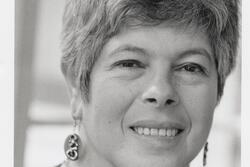An Interview With Joyce Antler about "Jewish Radical Feminism"
JWA sat down with Joyce Antler, renowned social and cultural historian, to discuss her most recent book, Jewish Radical Feminism: Voices from the Women's Liberation Movement.
You chose to group the stories in your book around different women's collectives. What inspired that decision?
Belonging to a collective unit was fundamental to radical feminists' perception of self. Historian and movement participant Linda Gordon said it well: for women's liberationists, “‘collective’ was a sacred liturgical word and ‘individualist’ a damnation.” Jews historically revered community as well. So the “collective” became a natural principle for organizing my book. The first part of the book tells the stories of Jewish members of women's liberation collectives who at that time did not identify Jewishly. These groups include Chicago's West Side Group; New York City's Redstockings; Boston's Bread and Roses, and the Boston Women's Health Book Collective (later known as Our Bodies, Ourselves). Part II tells the stories of women in collectives whose members did explicitly identify as Jewish, among them the religious collective Ezrat Nashim, secular Jewish feminist collectives like Brooklyn Bridge and Chutzpah, and Di Vilde Chayes, a radical lesbian Jewish feminist collective.
In an earlier book, The Journey Home: How Jewish Women Shaped Modern America (1997), you focused on female Jewish leaders who played key roles in earlier American social and political movements. How do the women in Jewish Radical Feminism continue this story?
In recovering the stories of radical Jewish feminists, my book shows how second-wave feminism built on the legacies of the past, including Jewish women's participation in the trade union movement, suffrage and liberal feminism, socialism and communism, civil rights and peace activism. Like their predecessors, radical Jewish feminists were ambivalent about Jewish religious and social customs that tended to marginalize them. At the same time, they were influenced by many elements of Jewish tradition, Jewish values, and Jewish activism.
You interviewed more than 40 women for the book. Why so many?
I wanted to show the great diversity of experience of among Jewish radical feminists and provide a fuller spectrum of Jewish feminist identity than we usually see. There were many common elements in these women's backgrounds and views, but there were marked distinctions as well. For example, I tell the stories of six Jewish feminists in my chapter on Our Bodies, Ourselves; one was a life-long observant Jew; another attended an Orthodox Hebrew Day School in a working-class community; a third woman was a child Holocaust survivor; two were daughters of labor union or Communist Party activists, and one identified no Jewish background, except the threat of anti-Semitism. All chapters present "side-by-side" stories of multiple women. How they meshed their activism with the problems and opportunities of Jewish feminist identity differed for individuals and groups of women.
What were some of the main takeaways from the stories you gathered?
The first major take-away is that despite historians' almost total neglect of their contributions, Jewish women played a leading role in the women's liberation movement. Also, I was surprised at the depth and vigor of their continued activism—for the past half a century. These Jewish radical feminists have made exceptional contributions as organizers and organizational leaders, writers and authors, professors and helping professionals. The interviews reveal their early and continuing struggles against patriarchy, and the depth of their sensitivity to other issues of injustice. The influence of Jewish values upon their work, even when not previously acknowledged, and on their continuing life achievements, turned out to be remarkable. I was also unprepared for the immense variety of background and influences, even among women who shared ideas and goals, that characterized my narrators.
There are many other take-aways, but one that I'd add is the tremendous courage these women exhibited—whether in the fight against sexism, or against anti-Semitism in their own movement, or in the tangles of the often virulent attacks against Zionism that erupted in the 1970s and 1980s (a preview of the embattled issues of feminism, intersectionality, and Zionism today). The willingness of these women to speak out—and to address these problems as Jewish women’s liberationists and Jewish feminists—stands out.
As you’ve pointed out, some of the women you interviewed didn't feel a direct connection between their feminism and their Jewish identity. What challenges—and opportunities—did this present?
The women in Part I of the book did not usually identify Jewishly at the time of the women's liberation movement, preferring feminism's gender universalism to what they considered to be a narrower Jewish particularism. Anti-semitism in society at large and on the left also deterred them from claiming Jewish identities. Over time, some of these women came to embrace Jewishness more openly, while others kept it at a distance. Giving them a chance to tell their Jewish stories proved to be a great opportunity for me, and allowed the narrators to reflect on significant dimensions of their lives. The Jewish feminist narrators in Part II also appreciated the opportunity to examine their own Jewish journeys and consider how these meshed with their feminist ones.
As the author and researcher, the challenge for me was to enable conversations that could be uncomfortable for narrators—since their subject matter had remained submerged, or in some cases, denied completely. Another issue that I fretted about was how narrators would feel about the public telling of private aspects of their lives. Of course, narrators had the chance to correct and otherwise change the final drafts I gave them, but the challenge of public exposure remained. I was delighted to encounter enthusiasm from almost everyone during the interviews and writing and editing process. So many women went out of their way to help me tell my story better, adding information and ideas. An army of feminists helped to make this book.
Jewish Radical Feminism is one of JWA's 2018-2019 Book List picks.







